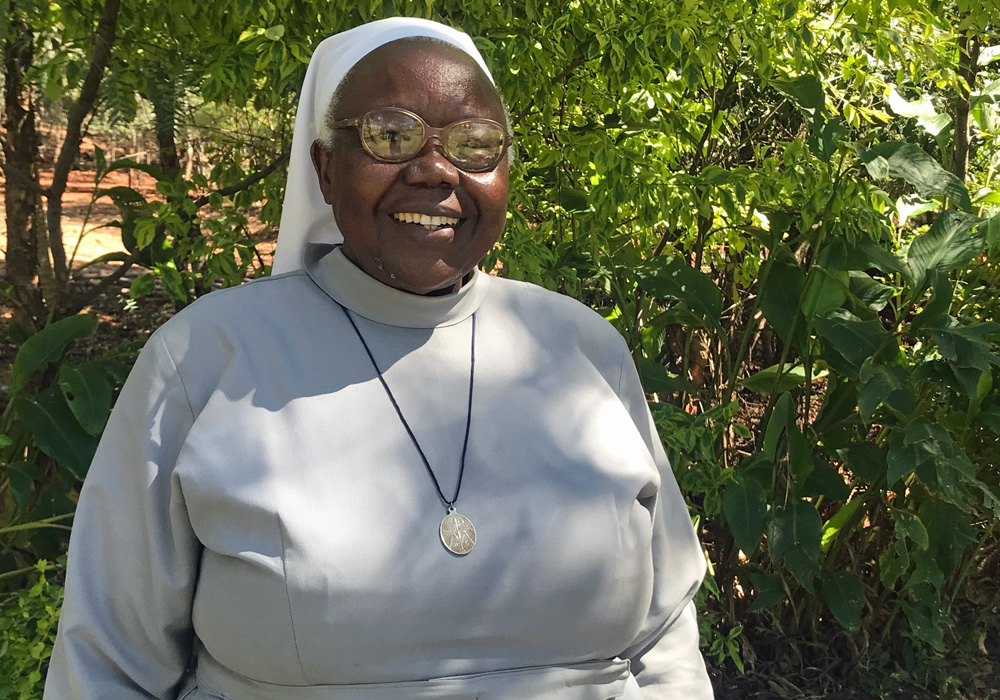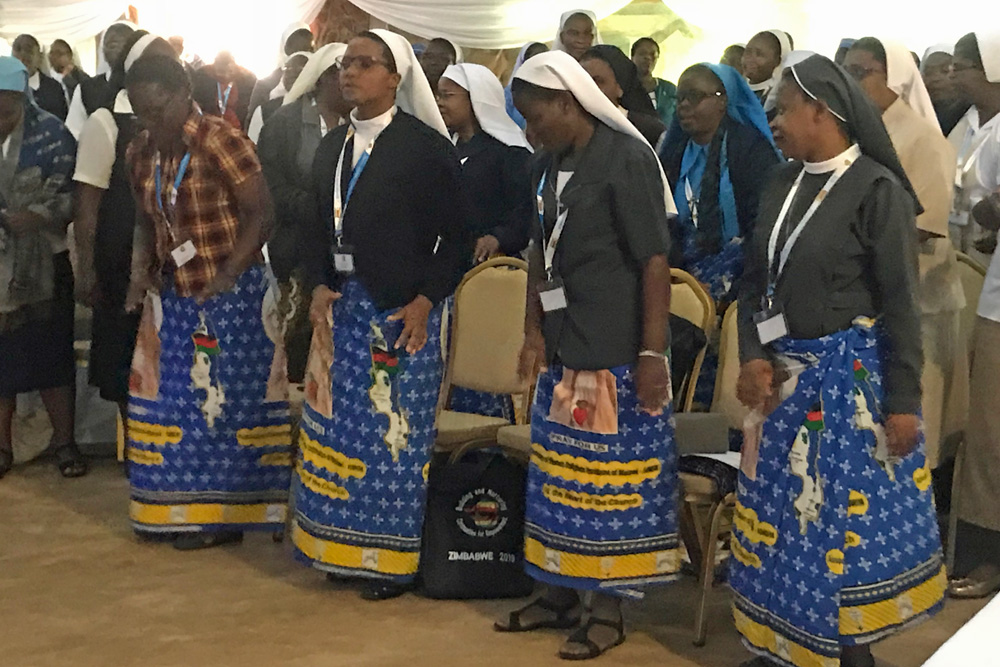
Sr. Teresa Namataka speaks to GSR on the sidelines of the All Africa Conference: Sister to Sister held in Harare recently (Frank Chikowore)
Through advanced education and training programs, women religious in sub-Saharan Africa are making new inroads in the delivery of specialized care to end the stigma and break the silence that surrounds people living with HIV/AIDS in the region.
To this end, more than 200 Catholic sisters from Cameroon, Malawi, Nigeria, Uganda, Zambia and Zimbabwe met in the Zimbabwean capital, Harare, in May, under the auspices of the All Africa Conference: Sister to Sister, to build a mutual support network and reenergize themselves as they seek to serve the HIV/AIDS community in sub-Saharan Africa.
During the conference, held in Zimbabwe on the country's turn on a rotational basis among member countries, Global Sisters Report caught up with Sr. Teresa Namataka of the Sisters of Mary of Kakamega in Kenya, who now lives in Kampala, Uganda.
Namataka, who is also an anti-human trafficking advocate in Uganda, played a pivotal role in setting up the Transformative Education and Faith, or TEF, degree program at Martyrs University in the Ugandan capital, Kampala.

Delegates from Malawi singing at the All Africa Conference: Sister to Sister in Harare (Frank Chikowore)
GSR: How did you get involved with the All Africa Conference: Sister to Sister program?
Namataka: I have been working for the conference for the last 16 years, following its introduction in Uganda. The conference was introduced in Uganda to help African sisters in dealing with HIV/AIDS issues. I became the coordinator at the conference that was facilitated by the Association of the Religious in Uganda. Since 2003, I was part of some women religious that moved from one religious community to the other, sensitizing women religious about the reality of HIV/AIDS, its effects on individuals, families and our religious vocation, as well as those who were infected with the virus.
Without any form of training, how did you manage to cope as you were dealing with people of various backgrounds?
The sensitization on HIV/AIDS awakened among religious sisters in Uganda to an extent that we decided to develop a counselors' training program to train people professionally in counseling because HIV brings a lot of issues that need special attention through professional counseling. Eventually, I helped to start the training of counselors in Uganda in 2003. From 2007, with funding from the Sisters of Mercy, I have been coordinating the training of sisters in HIV/AIDS, including recruitment, and in the process, we recruited sisters from Kenya, Uganda, Tanzania, Cameroon, Botswana, Malawi, Zambia and Zimbabwe, and even as far as Canada to train as counselors.
What does the training entail?
If people are trained and receive the right knowledge of their spirituality through studies, then they will have sound faith.
This understanding finally led to the development of a theology program we called Transformative Education and Faith [TEF]. It's a program accredited by the National Council in Uganda, and we are training people in spirituality and theological studies. The program has a well-rounded curriculum that includes Bible, pastoral theology, Catholic social teaching, fundamental theology and anthropology, and we have spirituality of religious life.
We want people to understand that the essential nature of a human being is actually to be spiritual and to be in connection with God. The curriculum also encompasses an introduction to philosophy and African philosophy.
After the program was accredited by the National Council, we started training the sisters last year, and we are using Uganda Martyrs University so that participants get an accredited certificate after completion of studies. Right now, we have the first cohort that started in August last year that has 21 students.
What challenges did you face in setting up the TEF program, if any?
We met a lot of challenges in getting people to see the value of training sisters in what I would call spirituality science. It was not easy. The sisters would rather go in for studies like being trained in teaching or nursing, but not this kind of thing. Getting these students was not easy.
When Sr. Rosemary Jeffries [executive director of the Religious Sisters of Mercy] visited Uganda, we invited some students who had joined the program to come and share the impact of the TEF program, and it was amazing that all of them said that this is the core of our consecrated life. They all said they should study the science of God so that they could approach their mission of teaching people in the communities to have sound faith in Jesus. So it is being appreciated.
It was difficult to convince the superiors and individuals to come for the course, but finally, those who are there have seen the value of integrating themselves in a better understanding of Jesus and the mission of Jesus in the world.
How long is this training program?
We have done it for two years at a diploma level so that after two years, the current students will get a diploma. However, the program has now been upgraded to a degree level so that some of those who will finish the diploma next year in May can continue to do a bachelor's degree.
What was the main intention for the religious in Uganda to have developed this TEF program?
We would like graduates of this program to become formators. When they have got sound formation in theological studies with skills of counseling, with skills of spiritual direction and with teaching schools, then the students — the girls, the men and the boys we get from society — who may have little foundation of their faith can be helped by these same people.
The first objective was to get a number of people trained so that they can go to houses of formation to train aspirants, postulants and novices.
How has your experience with the TEF program helped delegates at the All-Africa Conference: Sister to Sister?
I shared with them the value of training counselors professionally and the value of training people in faith, and we have asked them to send candidates to us. We already have had two candidates from Zimbabwe who have been trained up to bachelor's level. So we are urging member states to send sisters to train in counseling and theological studies so that when they go back to their countries, they can also set up training programs similar to the one that they would have received in Uganda.
As for Zimbabwe, we have accepted that they can take our curriculum that we have developed in Uganda and adopt it and go to the Catholic university so that they can start training people in faith, because it is expensive to travel to Uganda for the studies. This is how it is going to help people in this region. Other neighboring countries will then be able to send candidates to Zimbabwe to undergo training in theological studies.
Similarly, with counseling, according to the requirements, for a person to run a counselors' program at a university, she needs a master's degree, so if Zimbabwe gives us two sisters to train at a master's level, these two sisters will then come back and start a program at the Catholic university so that the religious women in Zimbabwe and neighboring countries can come and study counseling skills and acquire the necessary knowledge. Already, some people who attended the conference have expressed interest in going through the TEF program.
Is the TEF program free, or do candidates have to pay for the studies?
The Sisters of Mercy are soliciting funds to help us. They are working hard to help us, and they have sponsored this training since 2003. They have been helping us with funds for the sensitization program on HIV/AIDS and stress management because they see the value of well-trained sisters. When people are well trained and they have adequate knowledge, they will serve society better.
They are also encouraging us to learn the theology and spirituality of fundraising so that we sustain the training of people in spirituality and anthropological studies, which include counseling and other professional courses that can make the religious give better service to society, and the best service is to witness. If somebody can see that I live by the values that I have professed, I would have already converted that person, and then the teachings can follow.
Advertisement
As a sister working with various communities in delivering service, have you ever met any problem working with people who are not religious?
People appreciate going to institutions managed by the religious, and we serve all of them. Whether they are schools, hospitals or childcare homes, we give them equal training, so there is greater appreciation of being trained. For us as African sisters, one of the challenges we face is economic sustainability of the projects we run, but the people out there always want to be associated with institutions sponsored by the Catholic Church, which includes schools and hospitals.
Anything else you would like to tell us?
There are very few women theologians in Africa because we have always left theology to the priests. TEF program presents an opportunity for the women religious to close that gap. So by having our own sisters trained in theological and spirituality studies, we will have our own sisters who will teach these programs, so whenever we have theological programs in our houses of formation, we will not invite priests to come. When I talk to you or teach you, I speak from the heart. Men speak from the head, so they lack the feeling part. So TEF is to fill that gap.
[Frank Chikowore is an award-winning independent multimedia journalist based in Harare, Zimbabwe, who covers politics, business and other news in southern Africa.]






